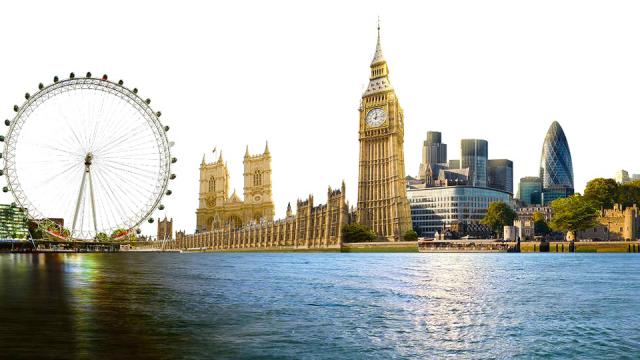
Widespread public opposition is halting the U.K. government’s plan to roll out fracking across Britain. Last week, the Scottish government announced a moratorium on fracking across Scotland, bringing what is effectively a full stop to the industry there until a public consultation decides whether to ban or allow fracking.
That decision has now become the leading edge of a U.K.-wide anti-fracking movement that has stopped any full-scale fracking since 2011.
Scotland Says: Let Scotland Decide
“The moratorium will be welcomed by communities across Scotland who have been alarmed by the gung-ho stance taken by the Westminster Government,” Scotland’s Energy Minister Fergus Ewing said, announcing the decision last Wednesday. He also criticized Labour claiming the party's anti-fracking stance was little more than hot air.
Last year’s independence referendum campaign revitalized progressive and participatory politics in Scotland, factors that contributed to the moratorium decision. Two driving forces in Scottish politics are the Green Yes and Radical Independence movements, both of which have led calls for a renewables future without fracking.
Across the whole of the U.K., the Green Party is gaining support it what is being heralded as the #GreenSurge, in large part due to the party’s unequivocal stance against fracking.
November’s Radical Independence Campaign conference showed that the participatory movement is as relevant as ever, and growing. It sold out a venue with over 3,000 delegates – a similar number as the Liberal Democrats, the junior U.K. government party, expects to attend their UK-wide conference later this year.
At the conference, Radical Independence pledged to stop fracking by all means, including direct action. Next weekend in Glasgow, it will hold an anti-fracking conference with hundreds planning to attend. Reacting to the Scottish announcement for a moratorium, conference organizer Gillian Wells told Common Space, a progressive media platform flourishing in post-referendum Scotland, that the movement now aims to deal the knock-out blow to fracking in Scotland.
Lancashire Delays Decision to Start Full-scale Fracking
In the north-west of England on the same day as the Scottish announcement, Lancashire County Council decided to delay its decision to grant planning permission for full-scale fracking on two sites near Blackpool. Hundreds of people, both locals and from across the country, protested outside in a carnival atmosphere.
One local resident, Ebony Ava-Johnson, from Residents Action on Fylde Fracking, explained what happened inside the council chambers. Numerous local groups had gone to great lengths to bring in experts to explain the extensive health, environmental and other dangers of fracking. With the council set to reject the planning application on noise and traffic issues, the fracking company Cuadrilla threatened legal action if the council continued with proceedings.
“Cuadrilla feel they can mitigate these factors,” Ava-Johnson explained, “as a rejection for them would be game over and seriously bad news for their investors. They are doing everything they can to stop the momentum that was building in the anti-fracking movement’s favor.”
Ava-Johnson suggested Cuadrilla’s tactics are frustrating both the local councilors and the anti-fracking movement, not least since experts traveled from far and wide to give evidence of fracking dangers. But she also had a positive takeaway.
“In eight weeks we will return with an even stronger case, including new evidence behind the State of New York decision to ban fracking due to ‘significant health impacts,’ a decision influenced by watching the harm of fracking in Pennsylvania,” she said. Ava-Johnson added that if British politicians continue to push in favor of the industry without taking into regard clear public health and safety issues, the public must take action to reclaim the power.
The breadth of public resistance to fracking included a convoy of farmers driving by in tractors to show their opposition, and a 75,000-person petition against the plans.
Campaigner Jamie Peters suggested the petition, while an effective tool, was just one example of how people across the U.K. are organizing against fracking.
“You need to see what’s been happening on the streets in Lancashire to understand the movement," Peters said. "Local people have signed thousands of letters to councilors, people have been arranging meetings and organizing at a local level. They are building sustainable anti-extraction movements.”
Peters, whose campaigning roles include UK team director for the Youth Climate Coalition, told Occupy.com that many of the people now energized by the anti-fracking movement had never been active on political issues before – and they're now standing up to Westminster in ever more creative ways.
Westminster Still wants to Frack
But in the face of rising public opposition, the majority of politicians are still going all out for shale. Last Monday, MPs held their first vote on fracking, including a proposal within the Infrastructure Bill to hold a UK-wide moratorium on the industry.
With 52 MPs voting to halt fracking and Labour abstaining, the Bill passed with a majority of 308. The decision showed that many MPs continue to support fracking despite new restrictions that have been added, including an exemption on fracking in national parks.
A U.K.-wide fracking moratorium was rejected despite a recent Environmental Audit Committee report that stated fracking will increase greenhouse gas emissions and pose “significant localized environmental risks to public health.”
A leaked letter written by the Chancellor of the Exchequer, George Osborne, shows the degree to which the British government is attempting to push for shale gas. Specifically, the letter revealed that the fracking company Cuadrilla is directing Osborne on how to promote the industry, and that Osborne has pressed the government to use its public relations heft to convince people that fracking is safe.
Reflecting on the hold-ups and delays, Peters suggested the fracking industry in the U.K. is crumbling. “The industry could not have any more favorable political conditions, yet the industry is totally toxic and dying on its feet,” he said.
3 WAYS TO SHOW YOUR SUPPORT
- Log in to post comments

















